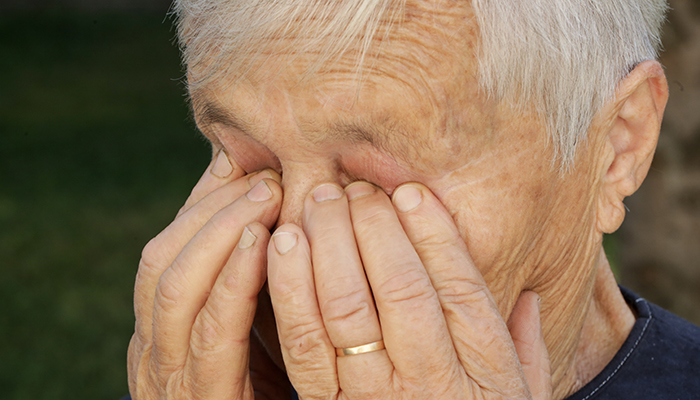
Our eyes help us experience the beauty of the world around us. Their health plays a role in our overall well-being, so when something goes wrong with them, it can affect our overall well-being. As we age, we have a higher risk of developing aging-related eye problems. One of the most common conditions is dry eye syndrome.
What Is Dry Eye Syndrome?
It’s important to remember that you’re not alone in this. Dry eye syndrome is a common eye disease affecting approximately 16 million people in the United States, including about 30% of older adults. It’s a shared experience, and there are ways to manage it.
What Causes Dry Eye Syndrome?
Dry eye syndrome has many common causes. Understanding the different causes of dry eye syndrome is important so that you can make lifestyle modifications to decrease your risk.
- Medications: Certain medications, such as antidepressants, antihistamines for allergies, and blood pressure medications, can cause dry eyes as a side effect.
- Age: Adults 50 and older have an increased risk of dry eyes.
- Screen Time: Looking at a screen for long periods without breaks can increase your risk.
- Contact Lenses: Wearing contact lenses instead of glasses can dry out your eyes.
- Substance Use: Drinking alcohol and smoking, including second-hand smoke, can cause dry eyes.
- Medical Conditions: Medical conditions like Blepharitis and auto-immune disorders like Sjögren’s Syndrome and Lupus can cause dry eyes.
- Other Environmental Factors: Other causes include sun exposure, air conditioning, and heated spaces. Windy, dusty, cold, and dry conditions also contribute to dry eyes.
Symptoms of Dry Eye Syndrome
Dry eye syndrome causes extreme discomfort, typically affecting both eyes. The signs and symptoms to watch out for include:
- Light Sensitivity: A common symptom of the condition is sensitivity to light.
- Difficulties: You may have trouble driving at night and wearing contact lenses.
- Mucus: Stringy mucus may form in or around your eyes.
- Eye Irritation: Eye redness and/or watery eyes can happen. Although dry eye syndrome causes dry eyes, your eyes may water as your body’s response to the irritation.
- Sensations: Your eyes may feel stinging, burning, scratchy, itchy, sensitive, and gritty. You may even feel like a foreign body is in your eye.
- Vision: Blurry vision and eye fatigue can happen.
We understand these symptoms are uncomfortable. Before consulting Google for medical advice, we recommend visiting your eye doctor. Your doctor will perform an eye exam to determine the underlying cause of your dry eyes. Now that you have a diagnosis and treatment plan for the cause of your dry eyes, you can try adding the following effective soothing home remedies.
9 Ways to Relieve Dry Eye Syndrome
Relief for dry eyes does not have to break the bank. Here are nine easy and affordable home remedies for soothing your beautiful eyes back to health. So you can find comfort without financial strain.
1. Warm Compresses
Find a clean washcloth and wet it with warm water. However, make sure the water is not too hot, where it could burn you.
Place the washcloth over your eyes twice a day. Press gently at the base of your eyelashes as it lays over your eyes. Reheat the washcloth whenever it starts getting cold.
The wet washcloth will help rehydrate your eyes. Its heat will loosen oils in your eyelashes that can cause build-up and interfere with tears.
2. Baby Shampoo
Your doctor may recommend gently messaging baby shampoo along your eyelashes. The baby shampoo can thoroughly cleanse them, but be careful not to get it in your eyes.
3. Eye Drops
You can buy over-the-counter “artificial tears” to soothe your dry eyes. However, you should avoid products that are designed to eliminate redness. Instead, use lubricating eye drops that come in small individual-dose containers. This option is better because they lack preservatives. You can use them five times a day or more.
4. Eye Ointment
Eye ointments are a longer-lasting alternative to eye drops. They keep your eyes lubricated for longer but can cause blurry vision. Therefore, we recommend saving this option for nighttime.
5. More Fluids
Drinking more water can help elevate your symptoms by providing more eye moisture. If you struggle with drinking enough water, try these tips.
6. Humidifiers
A humidifier can add humidity to the air, thus hydrating your eyes. Therefore, this extra moisture will reduce the chances of your eyes drying out. Using a humidifier is especially important in the winter because of the cold, dry air.
7. Change Your Contacts
You may find your contacts become uncomfortable because your eyes do not have enough moisture. Switching to daily disposable contacts may decrease eye irritation. However, if this is not for you, try giving your eyes a breather and wearing your glasses as needed.
8. Wraparound Sunglasses
The outdoors is great for our mental health, but wind and sun exposure can dry out our eyes. We promise you do not need to stay indoors because there are ways around this issue. Wearing wraparound sunglasses outside can protect you from the sun and wind. Doing this can also reduce the evaporation of your tears, keeping your eyes refreshed.
Wearing wraparound sunglasses outside can protect you from the sun and wind and reduce the evaporation of your tears.
9. Limit Screen Time
Looking at a computer screen for long periods can irritate your eyes. Instead, try the 20/20/20 rule.
Here’s how it works: every 20 minutes, get up for 20 seconds to stretch and focus on something at least 20 feet away. Although the 20/20/20 rule will not give you 20/20 eyesight, it will help your dry eyes.
Sometimes, the little things in life significantly impact our quality of life. Please contact us if you have any questions or need support with your family’s care. At Careplan Care Managers, we know how important something like eye comfort can be and can support you.
